Lottery Facts and Myths: History Of Lotto, From Roman Empire To Powerball 2016

With lines snaking all the way around the block for the estimated $1.5 billion Powerball jackpot, the lottery is bound to generate considerable revenue for state government budgets. It might seem like a fairly modern concept, but governments running a lottery is a practice that has been employed since ancient civilization.
The first recorded lottery was held in 1446, but there's evidence that China's Han dynasty used the practice to raise money for the construction of the Great Wall, according to the Smithsonian. It is also believed that lotteries were used by the ancient Romans, with forms of lotteries dating back to Caesar.
Funding government projects with lottery money was also seen again during the Elizabethan Age in Europe, according to the North American Association of State and Provincial Lotteries. Queen Elizabeth I established the state government lottery when she decided to hold a lottery instead of taxing citizens when in 1597 she needed funding for bolstering the royal fleet and rebuilding ports.
The Founding Fathers also operated lotteries for various projects. Benjamin Franklin used the lottery to pay for cannons for the Revolutionary War, and John Hancock started a lottery to restore Faneuil Hall in Boston. The Mountain Road, which enabled westward expansion from Virginia, was funded by a lottery started by President George Washington.
Lotteries did not always use numbers. The first known instance of a number lottery was not until 1515 during an election for the senate of the city of Genoa in Italy, when numbers were drawn to elect officials instead of names.
© Copyright IBTimes 2024. All rights reserved.






















